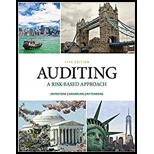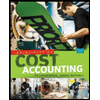
Bundle: Auditing: A Risk Based-approach, 11th + Mindtap Accounting, 1 Term (6 Months) Printed Access Card
11th Edition
ISBN: 9781337734455
Author: Karla M Johnstone-zehms, Audrey A. Gramling, Larry E. Rittenberg
Publisher: Cengage Learning
expand_more
expand_more
format_list_bulleted
Question
Chapter 1, Problem 22RQSC
To determine
Concept Introduction:
International Ethics Standards Board of Accountants (IESBA) −IESBA is an international body serving the public interest through setting of robust, internationally accepted ethics standards which include auditor’s independence, which needs to be followed by professional accountants around the world.
To describe:The five fundamental principles of ethics by IESBA
Expert Solution & Answer
Want to see the full answer?
Check out a sample textbook solution
Students have asked these similar questions
Can you help me solve this general accounting problem with the correct methodology?
I am trying to find the accurate solution to this general accounting problem with appropriate explanations.
Can you help me solve this general accounting question using valid accounting techniques?
Chapter 1 Solutions
Bundle: Auditing: A Risk Based-approach, 11th + Mindtap Accounting, 1 Term (6 Months) Printed Access Card
Ch. 1 - Prob. 1CYBKCh. 1 - Prob. 2CYBKCh. 1 - Prob. 3CYBKCh. 1 - Prob. 4CYBKCh. 1 - Prob. 5CYBKCh. 1 - Prob. 6CYBKCh. 1 - Prob. 7CYBKCh. 1 - Prob. 8CYBKCh. 1 - Prob. 9CYBKCh. 1 - Prob. 10CYBK
Ch. 1 - Prob. 11CYBKCh. 1 - Prob. 12CYBKCh. 1 - Utilitarian theory holds that what is ethical is...Ch. 1 - Prob. 14CYBKCh. 1 - Which of the following statements related to...Ch. 1 - Utilitarianism does not require which of the...Ch. 1 - Prob. 17CYBKCh. 1 - Prob. 18CYBKCh. 1 - Prob. 19CYBKCh. 1 - Which of the following factors is not an example...Ch. 1 - Prob. 1RQSCCh. 1 - Prob. 2RQSCCh. 1 - Prob. 3RQSCCh. 1 - Prob. 4RQSCCh. 1 - Prob. 5RQSCCh. 1 - Prob. 6RQSCCh. 1 - Prob. 7RQSCCh. 1 - Prob. 8RQSCCh. 1 - Prob. 9RQSCCh. 1 - Prob. 10RQSCCh. 1 - Prob. 11RQSCCh. 1 - Prob. 12RQSCCh. 1 - Prob. 13RQSCCh. 1 - Prob. 14RQSCCh. 1 - Prob. 15RQSCCh. 1 - Prob. 16RQSCCh. 1 - Prob. 17RQSCCh. 1 - Prob. 18RQSCCh. 1 - Prob. 19RQSCCh. 1 - Prob. 20RQSCCh. 1 - Prob. 21RQSCCh. 1 - Prob. 22RQSCCh. 1 - Prob. 23RQSCCh. 1 - Prob. 24RQSCCh. 1 - Prob. 25RQSCCh. 1 - Prob. 26RQSCCh. 1 - Prob. 27RQSCCh. 1 - Prob. 28RQSCCh. 1 - Prob. 29RQSCCh. 1 - Prob. 30RQSCCh. 1 - Prob. 31RQSCCh. 1 - Refer to the Why It Matters feature “What Is...Ch. 1 - Prob. 33RQSCCh. 1 - Prob. 34RQSCCh. 1 - Prob. 35RQSCCh. 1 - Prob. 36RQSCCh. 1 - Prob. 37RQSCCh. 1 - As the auditor for XYZ Company, you discover that...Ch. 1 - Prob. 39RQSCCh. 1 - Prob. 40RQSCCh. 1 - Prob. 41RQSCCh. 1 - Prob. 42RQSCCh. 1 - Prob. 43FFCh. 1 - Prob. 44FFCh. 1 - Prob. 45FFCh. 1 - Prob. 46FF
Knowledge Booster
Similar questions
- I need assistance with this financial accounting question using appropriate principles.arrow_forwardPlease explain the solution to this general accounting problem using the correct accounting principles.arrow_forwardConsider how the role of accountants has changed over time. Just a few short decades ago, many accountants were writing down by hand each business transaction into a general journal, manually posting to the general ledger, and physically adding ledger figures to construct trial balances and financial statements. Imagine how many people it took to perform these processes and then imagine how many organizations needed these people.” Accounting is changing once again. The relentless adoption of new technology continues to increase the automation of routine processes that accountants have performed for centuries… While this reality of machine learning and artificial intelligence could be perceived as a threat to the accounting profession, it should instead be seen as an opportunity: accountants can once again shed the responsibility for mundane, time-consuming transactions and focus instead on value-added activities. Accountants can leverage their newfound time into driving business…arrow_forward
- Define working capital and explain its importance in financial health and liquiditymanagement.2. Assess how the matching concept and accrual basis affect the reporting ofcurrent assets and liabilities.3. Using a hypothetical balance sheet (you may create one), identify at least 5current assets and 5 current liabilities and analyze how changes in theseelements affect liquidity ratios.4. Recommend at least two strategies to optimizeworking capital.arrow_forwardDiscuss and explain the picturearrow_forwardQuesti 7arrow_forward
- Financial accountingarrow_forwardBased on the attached amortization schedule, what is the amount for the interest expense and amortization expense that is missing from the ledger? 2 year term, 8 quarterly payments, 6% rate Initial lease $136768arrow_forwardSouthern Company leased high-tech electronic equipment from Edison Leasing on January 1, 2024. Edison purchased the equipment from International Machines at a cost of $136,768. 2 year lease, with 8 quarterly payments of $18,000 each, 6% interest rate. What is the amortization schedule for this loan starting Jan 1, 2024?arrow_forward
arrow_back_ios
SEE MORE QUESTIONS
arrow_forward_ios
Recommended textbooks for you
 Auditing: A Risk Based-Approach to Conducting a Q...AccountingISBN:9781305080577Author:Karla M Johnstone, Audrey A. Gramling, Larry E. RittenbergPublisher:South-Western College Pub
Auditing: A Risk Based-Approach to Conducting a Q...AccountingISBN:9781305080577Author:Karla M Johnstone, Audrey A. Gramling, Larry E. RittenbergPublisher:South-Western College Pub Auditing: A Risk Based-Approach (MindTap Course L...AccountingISBN:9781337619455Author:Karla M Johnstone, Audrey A. Gramling, Larry E. RittenbergPublisher:Cengage LearningPrinciples of Accounting Volume 2AccountingISBN:9781947172609Author:OpenStaxPublisher:OpenStax College
Auditing: A Risk Based-Approach (MindTap Course L...AccountingISBN:9781337619455Author:Karla M Johnstone, Audrey A. Gramling, Larry E. RittenbergPublisher:Cengage LearningPrinciples of Accounting Volume 2AccountingISBN:9781947172609Author:OpenStaxPublisher:OpenStax College Cornerstones of Financial AccountingAccountingISBN:9781337690881Author:Jay Rich, Jeff JonesPublisher:Cengage Learning
Cornerstones of Financial AccountingAccountingISBN:9781337690881Author:Jay Rich, Jeff JonesPublisher:Cengage Learning Principles of Cost AccountingAccountingISBN:9781305087408Author:Edward J. Vanderbeck, Maria R. MitchellPublisher:Cengage LearningBusiness/Professional Ethics Directors/Executives...AccountingISBN:9781337485913Author:BROOKSPublisher:Cengage
Principles of Cost AccountingAccountingISBN:9781305087408Author:Edward J. Vanderbeck, Maria R. MitchellPublisher:Cengage LearningBusiness/Professional Ethics Directors/Executives...AccountingISBN:9781337485913Author:BROOKSPublisher:Cengage

Auditing: A Risk Based-Approach to Conducting a Q...
Accounting
ISBN:9781305080577
Author:Karla M Johnstone, Audrey A. Gramling, Larry E. Rittenberg
Publisher:South-Western College Pub

Auditing: A Risk Based-Approach (MindTap Course L...
Accounting
ISBN:9781337619455
Author:Karla M Johnstone, Audrey A. Gramling, Larry E. Rittenberg
Publisher:Cengage Learning

Principles of Accounting Volume 2
Accounting
ISBN:9781947172609
Author:OpenStax
Publisher:OpenStax College

Cornerstones of Financial Accounting
Accounting
ISBN:9781337690881
Author:Jay Rich, Jeff Jones
Publisher:Cengage Learning

Principles of Cost Accounting
Accounting
ISBN:9781305087408
Author:Edward J. Vanderbeck, Maria R. Mitchell
Publisher:Cengage Learning

Business/Professional Ethics Directors/Executives...
Accounting
ISBN:9781337485913
Author:BROOKS
Publisher:Cengage